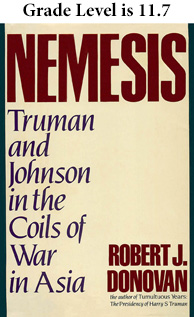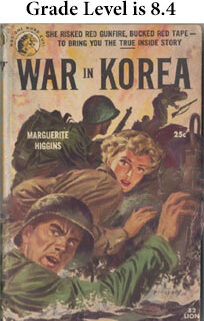Nemesis: Truman and Johnson in the Coils of War in Asia by Robert J. Donovan
The epub format below is for your Apple and Android devices including Send-to-Kindle for Amazon device.
As you may know, Amazon has changed to the epub format to use with the Send-to-Kindle program. A great feature of the Send-to-Kindle program is that the file will go directly to your Library folder, and does not have to be searched for in ES File Explorer or another app. If you use the mobi format in Send-to-Kindle, you will now get an error message. You can see instructions about Send to Kindle at https://www.amazon.com/gp/sendtokindle/email.
If you or your students want to download directly from this web site to an Amazon device, you can use the mobi format below. When you find the mobi file in ES File Explorer, it will then open in the Kindle app on your tablet. If you download an epub file to your Amazon tablet, it will also open if you have an app such as Overdrive on your tablet. The Kindle app offers an excellent reading experience to start with. Overdrive may need some customization of font size.
A Review from The New York Times
“Readable and at times even exciting” —The New York Times
Presidents Embattled by Drew Middleton, The New York Times, November 4, 1984
(Drew Middleton was the military correspondent of The New York Times.)
NEMESIS: Truman and Johnson in the Coils of War in Asia. By Robert J. Donovan. Illustrated. 216 pp.
Robert J. Donovan tackled an awesome task in this analysis of two American Presidents’ actions and reactions to two of the most agonizing political-military crises ever to beset the Republic. The result is a closely reasoned, well-researched commentary on troubles that convulsed the United States for a quarter of a century.
Mr. Donovan has presented in alternate sections descriptions of the military and political events that cost more than 100,000 American lives and dominated American politics. The reader is asked to move from the Yalu River to the councils of the Democratic Party leadership, and from the jungles of South Vietnam to the groves of academe where opposition to the fighting in those jungles flourished. Mr. Donovan’s success in making the book readable and at times even exciting is a tribute to his skill. Inevitably longer, more detailed comparative analyses of these situations will be published one day. But until they appear, ”Nemesis” should serve as a standard.
Two themes run through it. The first is that neither Truman’s Administration nor Johnson’s anticipated the endless complications, domestic and foreign, that would arise from the deployment of United States forces on the Asian mainland. Governments, democratic or otherwise, seldom do understand the consequences of such actions.
The second theme, which I wish Mr. Donovan had explored more fully, is the impact of recent history on policy making. The decisions about Korea by President Truman and his cabinet were affected strongly by what today would be called the Munich syndrome – a bitter memory of the surrender by Great Britain and France to Hitler’s demands at the Munich meeting of 1938. Ironically, the capitulation at Munich was partly inspired by British and French leaders’ memories of the millions of their compatriots who were killed or wounded during World War I. But Truman saw any failure to respond to the North Koreans’ attack on South Korea in 1950 as another Munich.
That attitude continued to affect Presidents Eisenhower, Kennedy and Johnson in the form of the ”domino theory” when they considered what to do about the slow disintegration of Vietnam after the French were defeated there in the 1950’s. They believed that the loss of South Vietnam would lead to the falling of other ”dominoes” in Asia. And the result is that the United States now suffers in the conduct of international affairs from the inhibiting influence of our loss in Vietnam.
Mr. Donovan, a seasoned reporter on politics who has written a highly praised two-volume biography of Truman, excels in recounting the criticism that fell on Truman and Johnson during their war years. Still vivid in public memory is the wave of criticism of Johnson, the Vietnam War and, in many cases, the entire American political and social system that broke over the White House in the 1960’s. But many will have forgotten the storm of abuse that burst on the White House after the dismissal of Gen. Douglas MacArthur from his command in Korea, abuse that included demands for Truman’s impeachment.
Mr. Donovan pays perhaps too much attention to the political ramifications of the two wars and, in my view, not enough to the military events and decisions that aroused these political responses. For instance, I would have welcomed a more thorough examination of the refusal by the White House to recognize that North Vietnam and not the Viet Cong was the enemy in the Vietnam War, and to consider plans for early attacks on Haiphong and Hanoi. One reason heard at the time was that such bombing would invite intervention by China. But at the time China was caught up in the opening of the Cultural Revolution and many experts believe it would have been unable to intervene effectively.
Mr. Donovan’s discussion of the later American air attacks on North Vietnam is balanced and makes the point, too often dismissed at the time, that in that predominantly agricultural economy there was really nothing much to bomb save key communications. North Vietnam wasn’t Germany.
Effective surprise by the enemies marred the American military performance in both wars and these surprises had a great impact on American politics. The Chinese attack on MacArthur’s forces in North Korea led to a major American military defeat – all the more grievous for public opinion in this country because it closely followed the successful American landings at Inchon harbor in North Korea. About 300,000 Chinese fell on the American and South Korean forces and MacArthur, who had been talking about getting the boys home by Christmas, faced what he called an entirely new war.
POLITICALLY, the Tet offensive in 1968 was the turning point of the Vietnam War, as Mr. Donovan illustrates. Although, as we now know, eventually both the North Vietnamese and the Viet Cong were defeated with heavy casualties in this offensive, the raid on the United States Embassy in Saigon gave the impression that the United States was losing the war in military terms.
Truman emerges from these pages as by far the more balanced and effective war leader – one who, of course, knew something of war at first hand. Johnson, on the contrary, seems volatile and uncertain, a consummate politician who in the end failed to understand the impact of war on politics.


